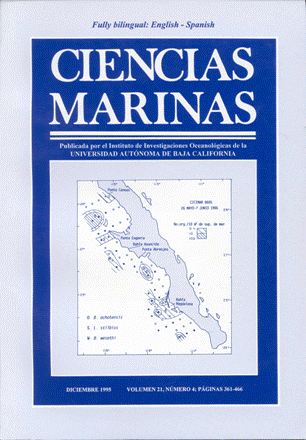Distribution of BOD and bacteria along the coast of the Us-Mexico border
Main Article Content
Abstract
Biochemical oxygen demand (BOD) and total coliform bacteria (TCB) from the Tijuana municipal outfall were analyzed from six surface samplings (5-7 February and 30 June to 2 July 1987), conducted along the coast between the US-Mexico border and north of Rosarito, Baja California. This study was carried out under two oceanographic conditions: with a littoral transport towards the South (February) and north (July). Results indicate that BOD and TCB surface distribution patterns remained relatively constant during the sampling periods, indicating a short-term (three-day) stationary plume. However, spatial distribution showed seasonal differences, with the highest concentrations of BOD (55 mg 1–1) and TCB (1,350,000 MPN 100 ml–1) occurring in summer. The surface distribution of the variables identifies a long- and offshore dispersion of matter, predominantly towards the South-southeast, indicating that the outfall is the principal source of BOD and TCB. Based on the physicochemical factors associated with the dispersion and degradation of the organic-bacteriological matter, it is unlikely that the surface outfall of the effluent from the San Antonio de los Buenos treatment plant, 9 km South of the border, affects the coasts of San Diego, California. The relatively high concentrations of BOD (2.0 mg 1–1) and TCB (1,000 MPN 100 ml–1) at the US border are due to sources from the north and non-point outfalls along the coast of Playas de Tijuana.
Downloads
Article Details
This is an open access article distributed under a Creative Commons Attribution 4.0 License, which allows you to share and adapt the work, as long as you give appropriate credit to the original author(s) and the source, provide a link to the Creative Commons license, and indicate if changes were made. Figures, tables and other elements in the article are included in the article’s CC BY 4.0 license, unless otherwise indicated. The journal title is protected by copyrights and not subject to this license. Full license deed can be viewed here.

